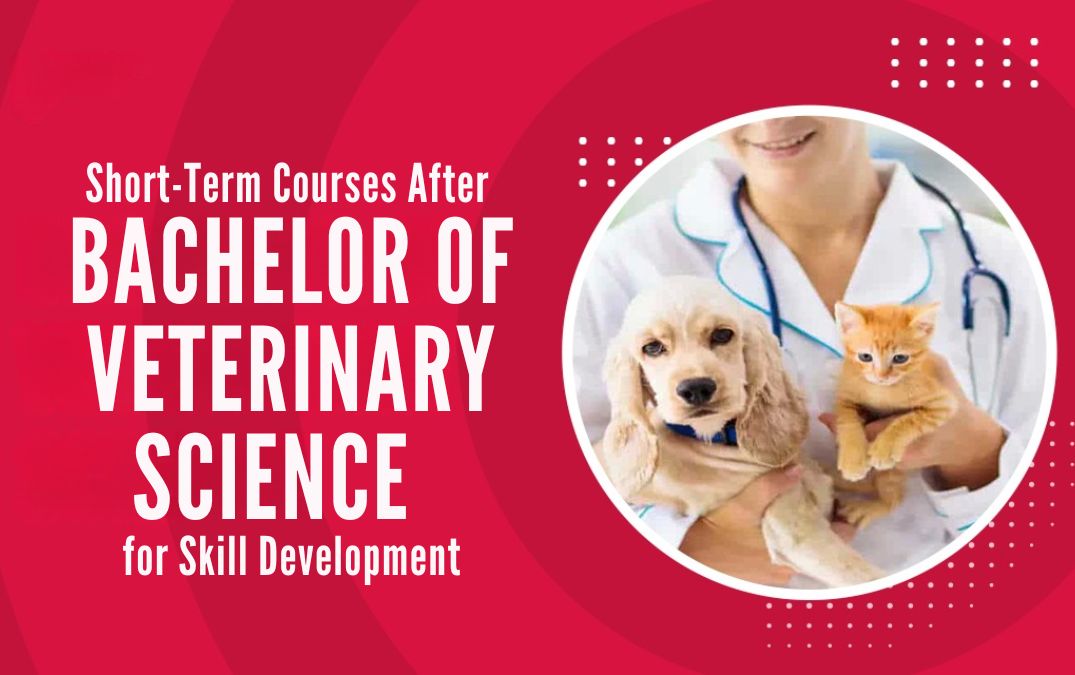This blog will help veterinary graduates (or even final-year students) discover practical, industry-relevant short-term courses that boost employability, clinical skills, or open new career paths.
Give me a moment while I fetch the latest, relevant short-term veterinary courses offered in India by universities, government bodies, and online platforms.
Top 5 Short-Term Courses After B.V.Sc
Pursuing a Bachelor of Veterinary Science (B.V.Sc) equips you with foundational knowledge in veterinary medicine. To further enhance your skills and stay competitive, enrolling in specialized short-term courses can be highly beneficial. Here are some notable programs available in India:
1. Post Graduate Diploma in Diagnostic Microbiology (PGDDM)
Institution: Rajiv Gandhi Institute of Veterinary Education & Research (RIVER), Puducherry
Duration: One year (Hybrid Mode)
Overview: This course focuses on understanding major infectious diseases and provides systematic knowledge on microbiological and immunological diagnostic techniques. It combines online theoretical modules with in-person practical sessions.
Eligibility: B.V.Sc & A.H. degree or B.Sc. in relevant biological sciences with a minimum of 55% marks.
Fees: ₹25,000 per annum
2. Post Graduate Diploma in Veterinary Laboratory Diagnosis
Institution: Rajiv Gandhi Institute of Veterinary Education & Research (RIVER), Puducherry
Duration: One year (Hybrid Mode)
Overview: This program aims to provide comprehensive understanding of clinical pathology, including hematological alterations, urine analysis, biochemical profiling, and diagnostic cytology. It integrates online theoretical learning with hands-on practical sessions.
Eligibility: B.V.Sc & A.H. degree
Fees: ₹20,000 per annum
3. Post Graduate Diploma in Forensic Veterinary Pathology
Institution: Rajiv Gandhi Institute of Veterinary Education & Research (RIVER), Puducherry
Duration: One year (Hybrid Mode)
Overview: This emerging field addresses the growing concern about animal welfare and the need for scientific evidence in legal cases involving animals. The course covers veterolegal necropsy procedures, laws related to veterinary practice, and common causes of animal death.
Eligibility: B.V.Sc & A.H. degree
Fees: ₹10,000 per annum
4. Post Graduate Diploma in Ayurveda Biology
Institution: The University of Trans-disciplinary Health Sciences and Technology (TDU), Bengaluru
Duration: One year
Overview: This unique program bridges traditional Ayurvedic knowledge with modern biological sciences. It covers core courses in contemporary biology alongside foundational knowledge in Ayurveda, aiming to integrate these disciplines for a holistic approach to health.
Eligibility: B.V.Sc & A.H. degree or B.Sc. in natural sciences, medical graduates (MBBS, BAMS, etc.), B.Pharm, B.Tech/B.E. in Biotechnology.
5. Short-Term Virtual Training on Zoonotic Diseases
Institution: College of Veterinary Sciences & Animal Husbandry, Central Agricultural University, Aizawl, Mizoram
Duration: Short-term (specific duration not specified)
Overview: This virtual training focuses on the status of zoonotic diseases, disease information systems, and surveillance tools. It’s designed to impart knowledge on current trends and management strategies related to zoonotic diseases.
Eligibility: Practicing veterinarians of government and non-government organizations with a minimum qualification of B.V.Sc & A.H.
Considerations When Choosing a Course
- Relevance to Career Goals: Select courses that align with your professional aspirations, whether in clinical practice, research, or specialized fields.
- Accreditation: Ensure the institution offering the course is recognized by relevant veterinary councils or educational authorities.
- Mode of Delivery: Consider whether the course is online, hybrid, or in-person, and choose according to your learning preferences and schedule.
- Financial Investment: Evaluate the course fees in relation to the potential return on investment in your career.
By enrolling in these specialized short-term courses, B.V.Sc graduates can enhance their skill sets, stay updated with advancements in veterinary science, and improve their employability in various sectors of animal health and welfare.
Who Should Take These Short-Term Courses?
These courses are ideal for:
- Fresh B.V.Sc graduates looking to enhance clinical or diagnostic skills.
- Veterinarians in practice who want to add niche expertise (e.g., microbiology, forensic pathology).
- Aspiring researchers or academicians preparing for M.V.Sc or Ph.D.
- Livestock consultants and animal health workers looking to upskill.
- Those interested in integrative approaches, such as Ayurveda-based animal healthcare.
Benefits of Short-Term Veterinary Courses
- Specialization in high-demand fields
- Better job prospects in private practice, diagnostics, and research
- Opportunity to work with NGOs, government, and pharma companies
- Flexible learning (many courses are hybrid or online)
- Affordable compared to full-time postgraduate degrees
Frequently Asked Questions (FAQs)
1. Are these short-term courses recognized by the Veterinary Council of India (VCI)?
Many are offered by government-affiliated institutions or veterinary colleges under ICAR or state agricultural universities. While they may not always lead to licensure, they enhance skills and employability.
2. Can I take these courses while working?
Yes! Most of these courses are designed in a hybrid mode (online + practicals), making them suitable for working professionals and practicing vets.
3. Do these courses offer placements or internships?
While full placements aren’t guaranteed, some institutions offer hands-on training, internships, and lab exposure which greatly improve job readiness.
4. Which course is best for diagnostic lab setup?
The Post Graduate Diploma in Veterinary Laboratory Diagnosis or Diagnostic Microbiology would be ideal if you’re planning to set up a diagnostic lab or pathology service.
5. Are there any free short-term courses available?
Government institutions and veterinary universities sometimes offer free training or workshops (especially on zoonotic diseases or livestock health). Keep checking websites like:
Final Thoughts
Short-term courses after B.V.Sc are excellent stepping stones—whether you want to start a private practice, explore diagnostics, pursue research, or expand your career options. The best part? These programs are affordable, flexible, and career-focused.
Investing 6–12 months in a focused program could be the difference between a generalist vet and a high-demand specialist in today’s growing animal health ecosystem.
